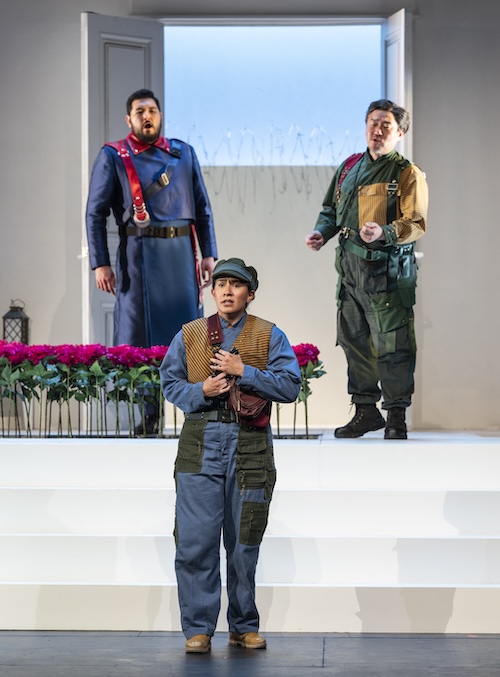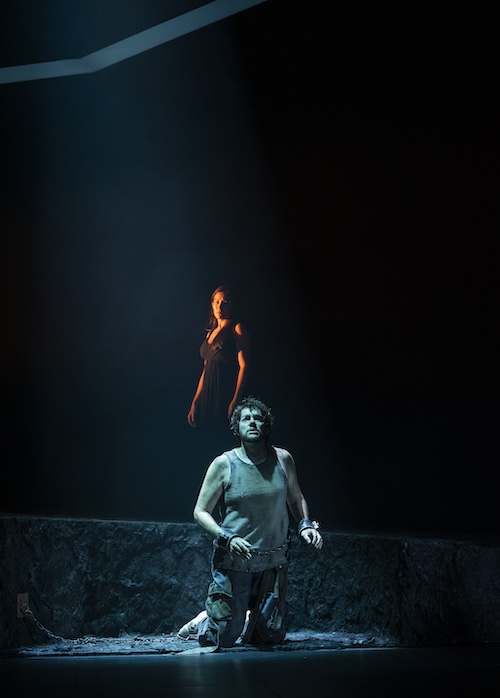Chicago Opera Theater presents a belated historic premiere with Paër’s “Leonora”

You want your Leonora, you got your Leonora.
Beethoven’s opera Fidelio—currently playing at Lyric Opera—was originally named Leonore and was the composer’s preferred title—sensibly so since it reflects the opera’s courageous heroine, which is also the largest role.
Beethoven’s title was changed to differentiate it from two other successful operas, also titled Leonora, setting the exact same story: one in French by Pierre Gaveaux and one in Italian by Ferdinando Paër.
In a bit of timely musical excavation, Chicago Opera Theater presented the centuries-belated American premiere of Paër’s Leonora Tuesday night at the Studebaker Theater, conducted by Dame Jane Glover.
An Italian composer of Austrian lineage, Paër was remarkably prolific, composing 55 operas. His most acclaimed works were Agnese, Camilla and Le maître de chapelle, which received performances in many European countries.
Paër’s Leonora, ossia L’amore coniugale (Leonora or Conjugal Love) premiered in 1804, less than a year before Beethoven’s opera. The narrative is almost identical to that of Fidelio, with the same seven characters. Leonora disguises herself as “Fedele” to rescue her husband Florestano, a political prisoner, held captive by his enemy Pizzarro who plans on assassinating him.
There are two main departures from Fidelio. Whereas Beethoven wrote soaring music for the jailed prisoners, Paër’s opera has no chorus. Also the role of Marcellina is more prominent here, with Rocco’s daughter—who is in love with Fedele—making an extended appearance in Florestan’s prison cell in Act II. (That proves more annoying than charming, as her repeated entreaties to Fedele/Leonora only serve to delay the opera’s denouement.)
The principal differences between Leonora and Fidelio are that of genre and musical style. Paër called Leonora a dramma semiserio, which well capsulizes an opera where the emphasis is on comedy as much as drama.
And while Beethoven bridged opera seria tradition with a more boldly dramatic, early Romantic style, Paër’s breezy music feels more of the late 18th century. In the lighter first act, particularly, Leonora often sounds like Mozart without the tunes. Add Paër’s emphasis on high-flying brilliance and one senses the showier bel canto arias on the horizon from Bellini and Donizetti.
Ultimately, if not always individual or indelible, Paër’s music for Leonora is smartly scored and unfailingly engaging. The second act has the best music with expressive arias for Leonora and Florestan and genuine musical drama building tension to the climactic quartet when an armed Leonora confronts Pizzarro to save her husband. (“Stand back or you’re dead!” Leonora warns in a prophetic bit of early 19th century film-noir dialog.)
The less dramatic style of the music means that Leonora can get by with lighter voices than Beethoven requires. And for the most part COT’s cast served up the necessary vocal brilliance very well.
Vanessa Becerra was most impressive in the demanding title role. Looking convincingly androgynous in her “Fedele” disguise, the young soprano acted credibly as Leonora throughout the often-absurd plot twists. She tackled the dizzying coloratura flights with security and panache in both her arias and the numerous ensembles.

As in Fidelio, the captive Florestano doesn’t appear until after intermission in Act II. Edgardo Rocha proved worth the wait and showed himself the real thing—singing his recitative and opening aria with a gleaming tenor with juice and Italianate squillo. Rocha showed some insecurity in the highest tessitura challenges, but this was undeniably a great performance with heroic vocalism and natural, understated acting.
Much of the comedy in Leonora comes in the boosted role of Marcellina, daughter of the jailer Rocco who is smitten with Fedele, Leonora’s alter ego. Keely Futterer proved only fitfully successful in this assignment; the soprano gave an energetic performance but was vocally shallow of tone with piercing top notes, and short on the requisite coquettish charm.
As the jailer Rocco, Joo Won Kang overdid the bluster in the early going, but contributed a big baritone to his arias and the many ensembles.
Don Pizzarro is a tenor role here and Matthew Pearce provided credible nasty in a forcefully sung portrayal of the villainous governor. (Chained in Florestan’s former position, Pizzarro can only sit and stew silently during the prolonged final ensemble.)
Alex Soare brought a likable stage presence and ample bass to Giachino, Marcellina’s ill-used lover. Kameron Alston displayed a plangent tenor in the deus ex machina role of the minister, Don Fernando.
Cameron Anderson’s glaringly bright set for Act I seemed unnecessarily stark and ironical yet contrasted effectively with the dark minimalism of Florstan’s cell for Act II. The stage direction by COT general director Lawrence Edelson was capably handled if a bit cliched at times in the would-be comedy of the first act.
Presiding over all was Dame Jane Glover in the pit. One rarely gets to hear Music of the Baroque’s music director in such unfamiliar repertoire as this. The British conductor led a spirited, well-prepared performance, drawing out the details and slender charms of Paër’s score while keeping the proceedings on the move. Glover’s balancing was scrupulous, not only between singers and orchestra but in keeping vocal lines distinct in the many ensembles that abound in Leonora —trios, quartets, quintets, sextets and even a brief septet.
The COT orchestra’s strings sounded dry-toned at times and horn playing was fitfully ragged opening night. But under Glover the winds brought out Paër’s lively writing and concertmaster Isabella Lippi provided a graceful obbligato violin solo in Florestan’s aria.
Leonora will be repeated 7:30 p.m. Friday and 3 p.m. Sunday at the Studebaker Theater. cot.org